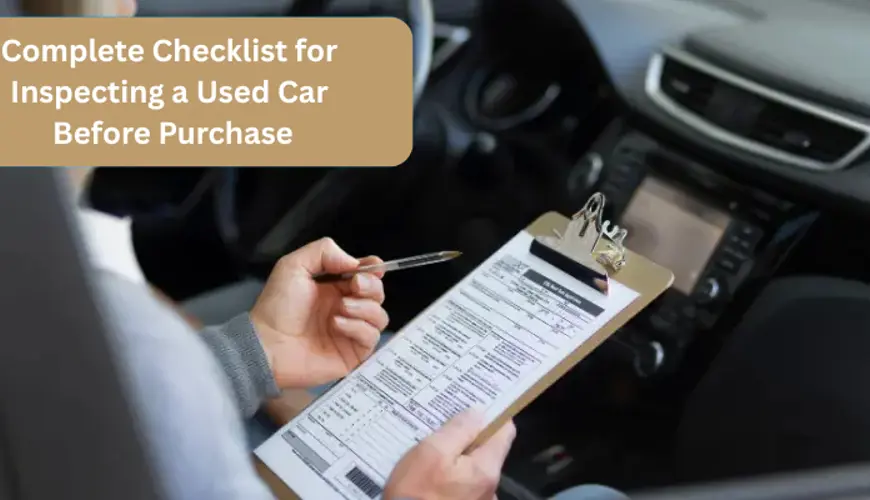Buying a used car can be a smart investment, but it comes with its own set of risks. Without a thorough check, you might end up with hidden issues that could cost you time and money. A used car inspection checklist ensures you know exactly what to look for before making a purchase. Considering a car pre-purchase inspection in Melbourne can help you avoid potential problems and make an informed decision.
At BCS Prestige, we provide comprehensive car pre-purchase inspection in Melbourne with complimentary pick-up and drop-off services. Our mechanics use advanced computer diagnostic systems to thoroughly examine used vehicles and identify any potential issues before you buy.
Need a pre-purchase inspection? Call us at (03) 9501 0010
This guide covers everything you need to know, from the body condition to mechanical integrity, so you can confidently purchase your next car.
Why a Pre-Purchase Inspection is Important?
When buying a used car, first impressions can be misleading. Some vehicles may look perfect from the outside, yet have underlying mechanical or technical problems. A pre-purchase inspection allows you to evaluate the car’s actual condition. A detailed car pre-purchase inspection can help to identify:
-
Hidden mechanical problems
-
Safety issues
-
Potential future repair costs
-
Signs of previous accidents
Always check the car before buying to ensure no essential areas are overlooked, giving you confidence in your purchase and protecting your investment.
Complete Used Car Inspection Checklist
Here’s a detailed checklist to help you inspect every part of a used car, from exterior to engine, ensuring you make a safe and informed purchase:
Exterior Inspection
Start with the car’s exterior. This is the first area to spot potential damage, rust, or signs of accidents.
Checklist for exterior inspection:
-
Check for dents, scratches, or paint inconsistencies.
-
Inspect for rust on wheel arches, underbody, and doors.
-
Verify that all doors, trunk, and hood open and close smoothly.
-
Examine headlights, tail lights, and indicators for cracks or fogging.
-
Look for signs of frame damage or misaligned panels.
-
Inspect tyres for wear, damage, and alignment.
Following a used car inspection checklist helps you spot any obvious issues on the car’s exterior.
Interior Inspection
The interior provides insight into the car’s overall care and usage.
Checklist for interior inspection:
-
Check the condition of seats, carpets, and upholstery for stains or tears.
-
Test all seat adjustments, including electric seats if available.
-
Ensure all buttons, switches, and controls work correctly.
-
Test the air conditioning, heating, and infotainment system.
-
Check the odometer for inconsistencies.
-
Look for unusual smells that could indicate water damage or mould.
When buying a used car, you should always include a detailed interior inspection to avoid unpleasant surprises later. Knowing how to inspect a used car from the inside out is just as important as the exterior check.
Engine and Mechanical Check
During a pre-purchase car inspection, pay special attention to the engine, as it’s the vehicle’s most important component.
Checklist for Engine and Mechanical Inspection:
-
Look for oil leaks, coolant leaks, or signs of engine wear.
-
Check the engine oil and transmission fluid levels and quality.
-
Inspect belts, hoses, and wiring for any cracks or signs of wear.
-
Start the engine and listen for any unusual noises, such as knocking or ticking.
-
Test acceleration and braking for smooth operation.
-
Check the exhaust for smoke, unusual colour, or odour.
Consulting a car mechanic near you for an engine check is highly recommended to avoid costly repairs after purchasing a vehicle. A thorough prestige car inspection goes beyond surface checks and includes a full mechanical assessment using advanced diagnostic tools.
Test Drive
A test drive is an essential step in any pre-purchase inspection.
Checklist for test drive:
-
Listen for unusual noises from the engine, suspension, or brakes.
-
Test braking efficiency and check for vibrations or pulling to one side.
-
Evaluate steering responsiveness and alignment.
-
Assess acceleration and transmission smoothness.
-
Check suspension performance on bumps and uneven roads.
-
Verify cruise control, parking sensors, and other driving aids.
Taking the car for a test drive ensures the vehicle performs as expected and meets your comfort standards.
Vehicle History and Paperwork
Checklist for vehicle history and paperwork:
-
Verify registration papers, service records, and ownership history.
-
Check for any outstanding finance or insurance claims.
-
Look up accident history using the vehicle identification number (VIN).
-
Ensure the car has a valid roadworthy certificate if required.
-
Confirm mileage aligns with the service records.
This step in your pre-purchase inspection checklist helps avoid legal complications and hidden costs in the future.
Additional Mechanical Checks
Even after checking the engine, brakes, and suspension, there are smaller but important mechanical aspects to inspect.
Checklist for additional mechanical checks:
-
Inspect brake pads, discs, and fluid levels.
-
Check transmission fluid and clutch operation.
-
Inspect suspension components, shocks, and struts.
-
Test battery health and electrical systems.
-
Ensure all fluids are topped up and free of contamination.
Learning how to check used car components at this level can save you from expensive surprises after purchase. A thorough pre-purchase inspection ensures these important mechanical systems are functioning efficiently.
For a deeper understanding of your car’s condition, you can also read our blog about What can a car diagnostic test tell you? to learn how a diagnostic check can help to identify hidden issues before purchase.
Why You Should Choose BCS Prestige for Your Pre-Purchase Inspection?
When it comes to car pre-purchase inspection in Melbourne, BCS Prestige provides reliable services you can trust. Our team of experienced car mechanics near you have experience in European and prestige vehicles, ensuring every inspection is comprehensive and reliable.
We focus on providing clear reports that help you make informed decisions before purchasing a used car. From engine health to bodywork and interior checks, our inspections cover all points on your used car inspection checklist, giving you confidence in your purchase.
At BCS Prestige, we also offer convenient services, such as car servicing and repairs, to ensure your vehicle remains in optimal condition after purchase. Choosing us for your pre-purchase inspection means you save time, avoid hidden costs, and secure a car that meets safety and performance standards.
Take Away
A thorough checklist for buying a used car can save you significant time, money, and stress. Always follow a structured used car inspection checklist that covers the exterior, interior, engine, mechanical components, and test drives. Use our checklist for test driving a used car to ensure the vehicle performs safely on the road. Verify paperwork and vehicle history to avoid hidden risks.
For a reliable car pre-purchase inspection and car service near you, trust BCS Prestige. Our team of car mechanics offers detailed inspections and recommendations, ensuring you make a safe and informed decision when purchasing a used car.
Taking these steps ensures you drive away confident, knowing your investment is sound and the car is roadworthy.
Contact us today to book a car inspection.
Frequently Asked Questions About Pre-Purchase Car Inspections
Q: How can I check if a used car has been well-maintained?
A: Look beyond the service records. Examine wear on pedals, steering wheel, and seats, which can indicate mileage and usage. Check fluid conditions, tyre wear patterns, and listen for engine noises during startup. Consistent maintenance habits often reflect the car’s long-term reliability.
Q: What should I look for in a used car’s tyres?
A: Check tyre tread depth, wear patterns, and manufacturing date (usually on the tyre sidewall). Uneven wear may indicate alignment issues or suspension problems. Avoid vehicles with tyres older than six years, as rubber deteriorates over time, even if the tread looks fine.
Q: Are there specific signs of a car being in a flood or accident?
A: Look for water stains, rust inside the cabin, or musty odours. Inspect carpets, electrical components, and the underside of the dashboard for signs of water damage. Also, mismatched paint, uneven gaps between panels, or weld marks can indicate past accident repairs.
Q: How important is checking the car’s electronics and features?
A: Modern cars rely heavily on electronics. Test lights, infotainment, sensors, and other features. Malfunctioning electronics may be costly to repair and can indicate underlying electrical problems that aren’t visible during a mechanical inspection.
Q: Can I rely on online vehicle history reports alone?
A: While online reports provide useful information, they may not be fully up-to-date or include minor accidents. Always pair them with a physical inspection and an experienced mechanic’s evaluation to ensure the car’s true condition matches its reported history.

















